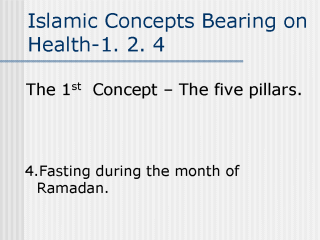| front |1 |2 |3 |4 |5 |6 |7 |8 |9 |10 |11 |12 |13 |14 |15 |16 |17 |18 |19 |20 |21 |22 |23 |24 |25 |26 |review |
 |
The fourth
pillar, “fasting during the month of Ramadhan” draws the attention to Muslims of the
importance of food, eating within limitations (a balanced diet). Several research have
shown the benefit of fasting on clinical health (Haas, 2002; Chaitow, 2002; Submission,
2002). Fasting was ordained so as a Muslim could learn self-restraint (Quran 2:183).
During the period of fasting, a Muslim abstains from taking any form of food or fluids for
a certain period of time (sunrise to sunset). By adhering to this, Muslims once more are
called upon to be disciplined, and so be able to breakout from harmful habits such as
smoking or eating too much for a period of time in a day. In this way after a month it is
more likely and much easier to be able to abstain from such habits, as the process is more
gradual and so much easier to sustain. Placing it on the Islamic health continuum, this
pillar also falls in the middle. The behavioral aspects would be more the indirect link
with the building up of discipline through self- restraint while the medical benefits
confirmed by empirical evidence would place the pillar more on the direct link point. A
similar focus on self-restraint is seen in contemporary notions of health promotion. Reference: Chaitow, L. (16th June 2002). Fasting for Health and as an Anti-Aging Strategy. Web site Haas, M. E. (16th June 2002). Nutritional Program for Fasting. Web site Submission. (16th June 2002). Prophet Muhammad’s Last Sermon http://www.submission.org/sermon.html |
| front |1 |2 |3 |4 |5 |6 |7 |8 |9 |10 |11 |12 |13 |14 |15 |16 |17 |18 |19 |20 |21 |22 |23 |24 |25 |26 |review |